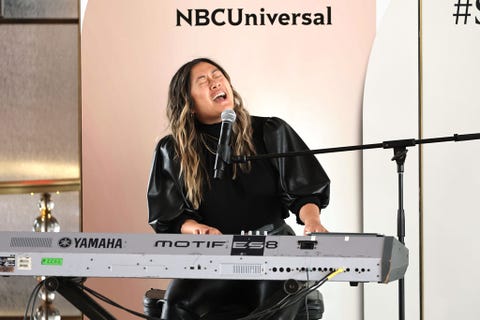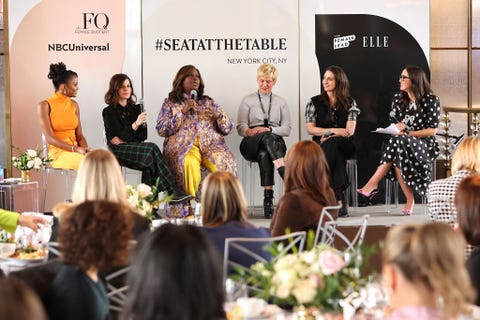The conversation was polite but powerful in Manhattan’s Rainbow Room yesterday morning, as around 100 women—many of them strangers to one another—sat for two and a half hours of problem-solving. Each
had arrived for the flagship celebration of A Seat At The Table, a global event enlisting female leaders to host roundtable discussions about gender inequity. Whether from their home’s dining table or the palatial midtown venue, the expectation was simple: Hosts would lead guests through a series of sample questions about how to tackle the monumental struggle of existing as a woman in a sexist world. The resulting solutions would perhaps be intangible, but, ideally, they’d be life-changing.
The Rainbow Room event—hosted by The Female Quotient, NBCUniversal, The Female Lead, and ELLE—opened with a stunning stripped-down performance by singer-songwriter Milck, who debuted the video for her single “Quiet,” sung by women around the world in their own native languages. (Watch the full clip above.) Afterward, The Female Quotient CEO Shelley Zalis and NBCUniversal executive Linda Yaccarino introduced the morning’s panelists: NBC News anchor Savannah Sellers; Parks and Recreation and Good Girls actress Retta; Girls5eva creator Meredith Scardino; Summer House star and ICU nurse Ciara Miller; singer Sara Bareilles; and NBC Olympics Production and Golf Channel executive Molly Solomon.

The conversation mostly centered around industry struggles, including work-life balance and the gender pay gap, as opposed to thornier issues like reproductive health and domestic violence. But the advice was nevertheless earnest and insightful, as each woman took the mic to detail her specific journey to the stage. Retta, in particular, had the other women nodding their heads as she described her feelings about self-advocacy: “It can be paralyzing to be the only woman in the room or on a stage. When you show up as your authentic self and stop caring about other’s opinion of you, you’re going to be successful,” she told the crowd.
As the questions continued, the panelists developed an almost sisterly rhythm. Solomon shared that, when analysts predicted NBC’s Olympics coverage might be a disaster, she’d listened to Bareilles’s “Brave” every morning for 21 days straight. And when Retta described how one of her primary methods for creating “seats at the table” for women was requesting a WOC-focused hair and makeup team, Miller jumped in to share her endorsement.
“We can’t underestimate the power of self-care,” she said. “Learning to take a step back so you can fully show up for your work is so crucial.”
But perhaps one of the most interesting moments came when the panelists admitted just how often women stand in the way of their own barrier-breaking. When describing how she’d begun hiring more women and women of color, Bareilles told the audience that, initially, “it was something that I just was blind to. I just wasn’t paying attention to it. I’m embarrassed to admit that, but it wasn’t something I was paying attention to. And then, now, I feel like, Put your money where your mouth is...I want to be a person who moves representation forward.”
The others agreed, particularly when it came to hiring practices and payment. Too often, Miller said, women are nervous to ask for more money, or even to discuss salaries amongst their colleagues. “How are we supposed to close the gap when we don’t even know what the gap is?” she said. “Don’t be afraid to ask other people what they make.”

Later, after the panel adjourned, guests participated in their own roundtable discussions, leading with questions such as, “What professions/industries are most in need of having more women at the table?” and “What is one issue impacting women’s equality that you’d like to see progress on in 2022?” Their responses, unfortunately, weren’t available for publication, but given the heightened emotions in the room—a surprise performance from 13-year-old Ukrainian violinist Karolina Protsenko moved some to tears—it’s likely they were compelling ones.
Although the event itself drew to a close, the minds behind A Seat At The Table made it clear that the morning was meant to be a practice, not a singularity. Sure, gleaming brunch plates at 30 Rock might be more enticing than cold takeout at home, but the conversation that took place around the meals is replicable—and, in fact, it must be, if any solutions are to become actions. As Zalis told the audience, “We always make room at the table. It could be bringing up a folding chair or making the table bigger; it doesn’t matter. We all belong. And we all have a seat for one another.”
